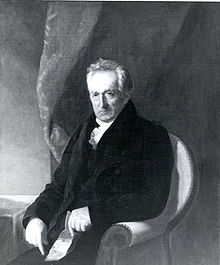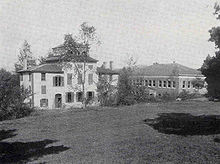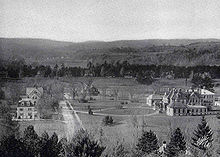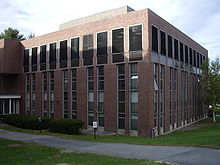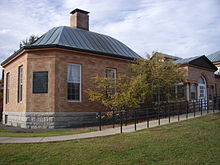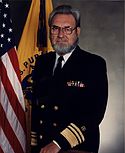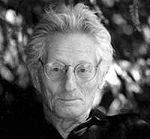- Dartmouth Medical School
-
Dartmouth Medical School 
Established November 22, 1797 Type Private medical school Dean Wiley Souba[1] Academic staff 2,315[2] Students 621[2] Location Hanover, New Hampshire, USA Campus Rural Website dms.dartmouth.edu Dartmouth Medical School (DMS) is the medical school of Dartmouth College, located in Hanover, New Hampshire, in the United States. The fourth-oldest medical school in the United States, Dartmouth Medical School was founded in 1797 by New England physician Nathan Smith and grew steadily over the course of the 19th century. In the early 1900s, it was forced to cease granting the Doctor of Medicine (M.D.) degree. After further problems in the 1950s, the clinical M.D. program was reinstated and the school returned to national prominence for its academics and research. Several milestones in medical care and research have taken place at DMS, including the first clinical X-ray (1896), the first intensive care unit in the United States (1955),[3] and the Brattleboro rat (1961).[4]
Today, Dartmouth Medical School continues to grant the M.D. and Doctor of Philosophy (Ph.D) degrees, as well as a Master of Public Health (MPH) and Master of Science (M.S.) degrees. The school has a student body of about 620 students and more than 2,300 faculty members and researchers. As part of the Dartmouth-Hitchcock Medical Center, DMS organizes research through over a dozen research centers and institutes, receiving more than US$100 million in grants annually. DMS is one of seven Ivy League medical schools and is ranked as a "top medical school" by U.S. News & World Report for both primary care and biomedical research.
Contents
History
Foundation and early years
Dartmouth Medical School was founded in 1797 as the fourth medical school in the United States, following the University of Pennsylvania School of Medicine (founded 1765), the medical school of King's College (now Columbia University) (1767), and Harvard Medical School (1782).[5] The founder was Nathan Smith, a Harvard University-educated physician from Cornish, New Hampshire. Noting the dearth of medical professionals in the rural Connecticut River Upper Valley area, Smith petitioned the Board of Trustees of Dartmouth College in August 1796 to fund the establishment of a medical school to train more physicians for the region. Though Dartmouth College as a whole was financially strapped, the Board approved the request, and Smith began lecturing on November 22, 1797.[6]
For much of its early life, Dartmouth Medical School consisted only of Nathan Smith and a small class of students, operating in borrowed space at Dartmouth College. Students of Smith were educated as apprentices, and received a Bachelor of Medicine degree upon graduation. Like Dartmouth College as a whole, DMS had continual funding shortages. As time passed, however, the popularity of both the medical instruction and the basic sciences taught at the school drew undergraduates and training physicians alike. Soliciting funds from the state of New Hampshire, Smith was able to obtain medical equipment and, by 1811, a dedicated physical plant for the school.[6]
Smith acted as the sole administrator and instructor of the medical school until 1810, when a second faculty member was hired. Smith also revamped the curriculum, allowing the school to begin offering the Doctor of Medicine (M.D.) degree in 1812. Smith ultimately left DMS in 1816, founding three additional schools of medicine at Yale University, Bowdoin College, and the University of Vermont.[6]
Expansion and difficulties
Smith's departure provided for a period of expansion, both among the faculty and the student body. Former students of Nathan Smith's replaced him on the faculty, drawing medical professionals in the northeast such as Oliver Wendell Holmes, Sr. to join them. The first hospital at Dartmouth Medical School was founded by DMS alumnus Dixi Crosby in 1838, who used it to integrate academic instruction with hands-on patient care. In 1870, Carlton Pennington Frost, DMS '57, replaced Crosby as Dean of the school. Under Frost, the curriculum sustained another revamping, this time into a four-year program that included clinical and academic training.[6] Frost also presided over the establishment of Mary Hitchcock Memorial Hospital in 1893, built to replace Crosby's defunct hospital.[7]
In 1908, The Carnegie Foundation for the Advancement of Teaching conducted a survey of medical education institutions in the United States. At the time, the discipline emphasized "bedside teaching" and providing students experience with a broad variety of illnesses and patients. Dartmouth Medical School's rural location was deemed too remote for proper clinical training, and the school was advised to stop offering the Doctor of Medicine degree and only provide pre-clinical instruction. The class of 1914 was the last (until 1974) to receive the Doctor of Medicine degree; subsequent classes of students attended DMS for two years before transferring to other medical schools. The drop of clinical instruction worsened the school's problems by driving away talented faculty members.[6]
After World War II, the tide of the medical discipline had shifted towards research. Although Dartmouth Medical School was well regarded for preparing students for clinical education at other institutions, its faculty was criticized for its apparent disinterest in research. The school was also criticized for using Dartmouth College's undergraduate program as a feeder school.[5] Based on these criticisms, DMS was placed on "confidential probation" in 1956 by the Association of American Medical Colleges and the Council on Medical Education.[6]
From the "refounding" to present
At the time of the probation, Dartmouth College had already anticipated the medical school's plight, amassing capital to fund a revitalization of the school. In 1956, the trustees of the College formally agreed to a "refounding" of Dartmouth Medical School's academic offerings, physical facilities, and faculty. S. Marsh Tenney, DMS class of 1944, was appointed to carry out this task.[6] Tenney more than doubled the size of the faculty and the student body, added several new departments, and oversaw the construction of five new campus buildings by 1964.[8][9][10][11][12]
In the 1960s, due to a national shortage of physicians and government incentives for schools that increased their class sizes, Dartmouth Medical School graduates began to experience difficulty in trying to transfer to other medical school to complete their final two years of medical school as other medical schools had increased their class size and could not accommodate transfer students.[5] In the meantime, Mary Hitchcock Memorial Hospital had grown to be a 400-bed medical center, and Dartmouth Medical School had established a partnership with a 224-bed Veterans Administration Hospital in White River Junction, Vermont. The Doctor of Medicine program, now possible with the expanded local medical centers, was reinstated by a vote of the trustees in 1968. The admission of M.D. candidates resumed in 1970.[6] Initially, the medical school curriculum was three years in length, unlike most medical schools, but it later was increased to the usual four years in 1979.[13]
A cooperative program with Brown Medical School began in 1981 where students received training at both medical schools.[14] Fifteen to twenty students were selected for the program, which combined the first two years of basic science coursework at Dartmouth with the final two years of clinical coursework at Brown. The program balanced Dartmouth's greater basic science facilities than Brown, but fewer clinical facilities than available at the urban setting of Brown, which is located in Providence, Rhode Island. Graduates of the program received M.D. degrees from Brown. The program will be discontinued in 2010.[15]
In 1991, the Dartmouth-Hitchcock Medical Center was established on a 225-acre (0.91 km2) campus in Lebanon, New Hampshire. The three-year project, completed at the cost of $228 million, served as a replacement for the Mary Hitchcock Memorial Hospital, which was partially demolished in the early 1990s.[16][17] A new curriculum was introduced in 1996 entitled "New Directions." The curriculum, still in place today, seeks to promote small classes, reduce the amount of lectures, and offer students extensive interactive experience with patients.[18] 2009 saw the successful completion of a $250 million capital campaign[19]
Campus
Dartmouth Medical School has facilities on the campus of Dartmouth College, which is situated in the rural, Upper Valley town of Hanover, New Hampshire as well as at Dartmouth-Hitchcock Medical Center (DHMC).[20]
The medical school facilities at Dartmouth College sits in a complex on the north side of Dartmouth's campus and includes academic, administrative, research, and presentation facilities.[21] DMS is served by two libraries, the Dana Biomedical Library and the Matthews-Fuller Health Sciences Library, which together offer 240,000 volumes.[22] DMS does not offer on-campus housing; however, off-campus housing is available through Dartmouth College.[23] In addition, the Class of 1978 Life Sciences Center is expected to be completed in August 2011 at a cost of $92 million, and as part of its design a central lawn will be created surrounded by the Remsen and Vail Laboratories and Dana.[24]
The Dartmouth-Hitchcock Medical Center, centered in nearby Lebanon, New Hampshire, is the umbrella medical organization of which Dartmouth Medical School is a constituent part.[25] Mary Hitchcock Memorial Hospital, DHMC's 396-bed inpatient facility, acts as the medical school's teaching hospital and "primary teaching site".[26][27] DHMC's other constituent elements include the Dartmouth-Hitchcock Clinic (a network of physicians in Vermont and New Hampshire) and a Veterans Affairs Medical Center in White River Junction, Vermont.[28] In total, DHMC serves an area with a population of 1.6 million.[27]
In addition to on-campus instruction in Hanover and Lebanon, third- and fourth-year M.D. students may choose from 75 regional sites for their required clerkships.[2] Most clerkship facilities are located in central New England, although students are also able to clerk at sites in Alaska, California, New Mexico, and Florida.[29]
Academics
Dartmouth Medical School Departments[2] Basic Science DepartmentsClinical Departments- Anesthesiology
- Community and Family Medicine
- Medicine
- Obstetrics and Gynecology
- Orthopedics
- Pathology
- Pediatrics
- Psychiatry
- Radiology
- Surgery
Dartmouth Medical School offers the four-year Doctor of Medicine (M.D.) degree[2][30] and the Doctor of Philosophy (Ph.D) degree in certain fields.[31] In addition, the school offers two joint-degree programs: the combination M.D./Ph.D., for which the Ph.D. can be obtained from any doctoral program at Dartmouth,[32] and the combination MD/MBA,[33] offered in conjunction with the Tuck School of Business.[34] The Dartmouth Institute for Health Policy and Clinical Practice,[a] one of a number of DMS research institutes, offers its own degree programs in evaluative clinical sciences, including a Master of Public Health (MPH), a Master of Science (M.S.), a Ph.D., post-doctoral fellowships, several joint-degree programs, and a residency program for preventive medicine.[35] Mary Hitchcock Memorial Hospital also offers residencies and fellowships which are administered by Dartmouth Medical School faculty.[36]
The curriculum for the Doctor of Medicine degree spans four years, combining required courses with electives. First-year students learn human anatomy and basic biomedical science in classes offered by the basic science departments, while beginning a two-year course of study in clinical studies. Second-year students study pathophysiology and take courses from almost every clinical and basic science department in the school. In their third year, M.D. candidates are required to participate in six eight-week Medical clerkships with area medical institutions, covering both ambulatory clinics and hospitals.[29] The final year is spent on additional clerkships, the designation of an area of focus, and preparation for a post-graduation residency.[30] In addition to imparting medical and clinical knowledge, the M.D. program is designed to teach "interpersonal and communications skills", "professionalism", and other practical skills for a medical career.[29]
Dartmouth Medical School also offers the Doctor of Philosophy degree to train students as biomedical researchers and scientists. The Ph.D. is available in six fields offered by the basic science departments: pharmacology and toxicology, molecular and cell biology, immunology, molecular pathogenesis, systems biology, and experimental and molecular medicine. Research and teaching positions at DMS and its centers and institutes are available to Ph.D. candidates.[31]
Organization and research
Like the undergraduate portion of Dartmouth College, Dartmouth Medical School operates on a quarter system.[37] As part of the larger institution, DMS is ultimately administered by Dartmouth's President and Board of Trustees. The school is directly managed by a Dean who is advised by a fourteen-member Board of Overseers.[38] As of the 2008-2009 academic year[update], the school operates on a budget of $237 million.[2]
Besides research conducted within the infrastructure of academic departments, research at DMS and DHMC is also organized around over a dozen research centers and institutes. The centers cover various medical subjects such as neuroscience, oncology (Norris Cotton Cancer Center), psychiatry, and pediatrics.[39] Funded research at Dartmouth Medical School amounted to $123 million during the 2006-2007 academic year;[2] the school claims to be in the top 10% of American medical schools in terms of "basic science research funding on a per faculty member basis."[40]
Admissions and rankings
In the fall of 2009, 84 students enrolled in the Doctor of Medicine program from an applicant pool of 5,294,[2] with the Office of Admissions offering an acceptance rate of 7 percent.[41] Applicants from the previous year had an average score in the numerically graded sections of Medical College Admission Test (MCAT) of 34 and an average undergraduate grade point average (GPA) of 3.8.[42] Applicants to the M.D. program are expected to have a background in chemistry, biology, physics, and calculus, and are required to have at least three years of undergraduate education.[42]
Dartmouth Medical School is accredited by the Liaison Council on Medical Education.[43] None of the residencies programs of Mary Hitchcock Medical Center, which are administered by Dartmouth Medical School faculty, are on probation by the Accreditation Council for Graduate Medical Education.[44]
For 2011, Dartmouth Medical School was ranked by U.S. News & World Report as 67th on the "Top Medical Schools - Primary Care" list and 32nd on the "Top Medical Schools - Research" list.[45]
People
Student profile and student life
Dartmouth Medical School's enrollment as of October 2007[update] totaled 621 students: 315 M.D. candidates and 305 graduate students. 34 students elected to pursue the dual degree program, seeking both the M.D. and Ph.D. degrees. In addition to the student body, over 350 resident physicians and research fellows were on campus as of July 2007[update].[2] The student population is split approximately evenly between men and women,[46] while about 25 percent of the student body is made up of international or minority students.[47] From an average class size of 75, over 60 undergraduate institutions and most of the U.S. states are represented.[47] According to The Princeton Review, the small class size at DMS helps to establish "a strong sense of community and collaborative spirit".[47] The school offers about a dozen community service, recreational, professional, and other student groups.[48]
Faculty
As of November 2007, Dartmouth Medical School employs a staff of 2,315 faculty and researchers: 766 full-time faculty, 1,301 part-time faculty and non-faculty instructors, and 248 research positions.[2] The ratio of full-time, on-site faculty to students is given by the school as 2:1.[50] Notable current faculty include Stuart Gitlow,[51] former Surgeon General of the United States C. Everett Koop,[52] palliative care physician Ira Byock,[49] former astronaut and Democratic politician Jay C. Buckey,[53] psychoanalyst Peter A. Olsson,[54] and biochemist William T. Wickner.[55] Notable former faculty include biochemist Mahlon Hoagland[56] and pathologist and geneticist Kurt Benirschke.[57]
Alumni
As of June 2009, Dartmouth Medical School claims 4,505 living graduates active in medicine around the world.[2][58] DMS cites its required clerkships as a mechanism for allowing students to make connections and obtain real-world experience.[46] Fourth-year students are prepared for residency with counseling classes;[30] recent graduates have most commonly taken their residencies at Dartmouth Medical School itself, the Harvard Medical School, the Tufts University School of Medicine, and Brown Medical School.[59] Alumni of Dartmouth Medical School who have become notable medical practitioners and researchers include physician and freethinker Charles Knowlton,[60] consciousness researcher John C. Lilly,[61] physician Robert O. Blood,[62] ophthalmologist and epidemiologist John D. Bullock,[63] and attending physician at the United States Capitol John Francis Eisold.[64] Alumni in other fields include U.S. Representatives Richard S. Molony and Robert Burns,[65] Governor of New Hampshire Noah Martin,[66] and television personality Ian Smith.[67]
Notes
- ^a Formerly the Center for the Evaluative Clinical Sciences (CECS). Some of the sources cited still refer to it as such.
References
- ^ "Ohio State dean, health sciences VP to lead Dartmouth Medical School". http://dms.dartmouth.edu/news/2010/09/09_souba.shtml.
- ^ a b c d e f g h i j k "Dartmouth Medical School Facts & Figures". Dartmouth Medical School. http://dms.dartmouth.edu/about/information/dms_facts.shtml. Retrieved 2010-10-09.
- ^ "Remembering Dr. William Mosenthal: A simple idea from a special surgeon". Dartmouth Medicine 28 (3). Spring 2004. http://dartmed.dartmouth.edu/spring04/html/vs_mosenthal.shtml.
- ^ "Dartmouth Medical Milestones". Dartmouth Medical School. http://dms.dartmouth.edu/about/information/milestones.shtml. Retrieved 2007-12-21.
- ^ a b c White, Paul Dudley (June 1973). "Review of 'Dartmouth Medical School: The First 176 Years'". The New England Quarterly. pp. 306–308. http://links.jstor.org/sici?sici=0028-4866(197306)46%3A2%3C306%3ADMSTF1%3E2.0.CO%3B2-Q. Retrieved 2007-12-21.
- ^ a b c d e f g h Blough, Barbara; Dana Cook Grossman. "Two Hundred Years of Medicine at Dartmouth". Dartmouth Medical School. http://dms.dartmouth.edu/about/history/history.shtml. Retrieved 2007-12-21.
- ^ "Farewell to the MHMH". Darmo.: The Buildings of Dartmouth College. http://www.dartmo.com/mhmh/index.html. Retrieved 2007-12-21.
- ^ "Butler 1&2". Dartmo.: The Buildings of Dartmouth College. http://www.dartmo.com/buildings/abbldg.html#butler1&2. Retrieved 2007-12-21.
- ^ "Dana Biomedical Library". Dartmo.: The Buildings of Dartmouth College. http://www.dartmo.com/buildings/cdbldg.html#danabiomedicallibrary. Retrieved 2007-12-21.
- ^ "Kellogg Auditorium". Dartmo.: The Buildings of Dartmouth College. http://www.dartmo.com/buildings/ghijkbldg.html#kellog. Retrieved 2007-12-21.
- ^ "Remsen". Dartmo.: The Buildings of Dartmouth College. http://www.dartmo.com/buildings/qrsbldg.html#remsen. Retrieved 2007-12-21.
- ^ "Strasenburgh Dormitory". Dartmo.: The Buildings of Dartmouth College. http://www.dartmo.com/buildings/qrsbldg.html#strasenburgh. Retrieved 2007-12-21.
- ^ Medicine: History, Dartmouth College Library. Retrieved 2008-01-07.
- ^ Medical Education at Brown: An Overview, Brown Alpert Medical School. Retrieved 2008-01-07.
- ^ Kelleher, K. (April 25, 2007), Brown-Dartmouth medical program to end in 2010, The Brown Daily Herald. Retrieved 2008-01-07.
- ^ "Our History". Dartmouth-Hitchcock Medical Center. http://www.dhmc.org/webpage.cfm?site_id=2&org_id=566&morg_id=0&sec_id=0&gsec_id=42&item_id=42. Retrieved 2007-12-21.
- ^ "Farewell to the MHMH". Dartmo.: The Buildings of Dartmouth College. http://www.dartmo.com/mhmh/index.html. Retrieved 2007-12-21.
- ^ "Cover Note: Dartmouth Medical School" (PDF). Academic Medicine. Association of American Medical Colleges. January 2005. pp. 4. http://www.academicmedicine.org/pt/re/acmed/pdfhandler.00001888-200501000-00003.pdf. Retrieved 2007-12-21.
- ^ "Transforming Medicine". http://transmed.dartmouth.edu/.
- ^ "Administration". Dartmouth Medical School. http://dms.dartmouth.edu/admin/. Retrieved 2008-01-01.
- ^ "Campus Map". Dartmouth College. http://dms.dartmouth.edu/about/maps/campus.html. Retrieved 2007-10-10.
- ^ "History of the Biomedical Libraries". Dartmouth Medical School. http://www.dartmouth.edu/~biomed/about.htmld/. Retrieved 2007-12-20.
- ^ "Housing & Real Estate". Dartmouth Medical School. Archived from the original on October 13, 2007. http://web.archive.org/web/20071013203616/http://dms.dartmouth.edu/students/resources/resources/resources_housing.shtml. Retrieved 2007-12-20.
- ^ "Life Sciences Building". Office of Design, Planning, and Construction. http://www.dartmouth.edu/~opdc/projects/lsc/index.html. Retrieved 2010-09-20.
- ^ "About Dartmouth-Hitchcock Medical Center". Dartmouth-Hitchcock Medical Center. http://www.dhmc.org/webpage.cfm?site_id=2&org_id=566&gsec_id=0&sec_id=0&item_id=30016. Retrieved 2007-12-21.
- ^ "Mary Hitchcock Memorial Hospital". Dartmouth-Hitchcock Medical Center. Archived from the original on October 13, 2007. http://web.archive.org/web/20071013124234/http://www.dhmc.org/webpage.cfm?site_id=2&org_id=566&morg_id=0&sec_id=0&gsec_id=39&item_id=41397. Retrieved 2007-12-21.
- ^ a b "Learning Sites and Facilities". Dartmouth Medical School: M.D. Admissions. http://dms.dartmouth.edu/admissions/learning_sites/. Retrieved 2007-12-20.
- ^ "DHMC Organizational Chart". Dartmouth-Hitchcock Medical Center. Archived from the original on January 17, 2008. http://web.archive.org/web/20080117140648/http://www.dhmc.org/webpage.cfm?site_id=2&org_id=566&morg_id=0&sec_id=0&gsec_id=39&item_id=35179. Retrieved 2007-12-21.
- ^ a b c "Curriculum". Dartmouth Medical School: M.D. Admissions. http://dms.dartmouth.edu/admissions/curriculum/. Retrieved 2007-12-20.
- ^ a b c "The M.D. Program Courses: Curriculum Overview". Dartmouth Medical School. http://dms.dartmouth.edu/ed_programs/mdprog.shtml. Retrieved 2007-12-20.
- ^ a b "Graduate Education in Basic Science". Dartmouth Medical School. http://dms.dartmouth.edu/ed_programs/grad.shtml. Retrieved 2007-12-20.
- ^ "Welcome to the M.D.-Ph.D. Program". Dartmouth Medical School. http://dms.dartmouth.edu/ed_programs/md_phdprog.shtml. Retrieved 2007-12-20.
- ^ "MD/MBA Program at Dartmouth Medical School". http://dms.dartmouth.edu/mdmba/.
- ^ "The MD/MBA Program at Dartmouth". Dartmouth Medical School. http://dms.dartmouth.edu/ed_programs/md_mbaprog.shtml. Retrieved 2007-12-20.
- ^ "Graduate Programs". Dartmouth Institute for Health Policy and Clinical Practice. http://ecs.dartmouth.edu/pages/programs.htm. Retrieved 2007-12-20.
- ^ "Affiliated Graduate Medical Education". Dartmouth Medical School. http://dms.dartmouth.edu/ed_programs/gme.shtml. Retrieved 2007-12-20.
- ^ "Dartmouth Medical School Calendar 2007-2008" (PDF). Dartmouth Medical School. http://dms.dartmouth.edu/admin/registrar/reg_forms/yr1_cal_07-08.pdf. Retrieved 2007-12-21.[dead link]
- ^ "Dartmouth Medical School Board of Overseers". Dartmouth Medical School. http://dms.dartmouth.edu/dean/boo/index.shtml. Retrieved 2007-12-20.
- ^ "Research Centers, Institutes and Programs". Dartmouth Medical School. http://dms.dartmouth.edu/research/programs.shtml. Retrieved 2007-12-21.
- ^ "Research". Dartmouth Medical School: M.D. Admissions. http://dms.dartmouth.edu/admissions/research/. Retrieved 2007-12-20.
- ^ "Dartmouth Medical School". America's Best Graduate Schools 2008. U.S. News & World Report. http://grad-schools.usnews.rankingsandreviews.com/usnews/edu/grad/directory/dir-med/brief/glanc_04065_brief.php. Retrieved 2007-12-21.
- ^ a b "Admission". Dartmouth Medical School: M.D. Admissions. http://dms.dartmouth.edu/admissions/admission/. Retrieved 2007-12-20.
- ^ Directory of Accredited Medical Education Programs, Liaison Council on Medical Education. Retrieved 2008-01-12.
- ^ Search Programs/Sponsors, Accreditation Council for Graduate Medical Education. Retrieved 2008-01-12.
- ^ "Dartmouth Medical School". Best Medical Schools. U.S. News. 2011. http://grad-schools.usnews.rankingsandreviews.com/best-graduate-schools/top-medical-schools/dartmouth-medical-school-04065. Retrieved 22 November 2011.
- ^ a b "Who Comes to Dartmouth?". Dartmouth Medical School: M.D. Admissions. http://dms.dartmouth.edu/admissions/who_comes_to_dartmouth/. Retrieved 2007-12-21.
- ^ a b c "Dartmouth College: Student Life". The Princeton Review. http://www.princetonreview.com/medical/research/profiles/studentlife.asp?listing=1033667<id=11. Retrieved 2007-12-21.
- ^ "Student Organizations and Community Service". Dartmouth Medical School. http://dms.dartmouth.edu/students/organizations/. Retrieved 2007-12-20.
- ^ a b "Ira Byock". Dartmouth-Hitchcock Medical Center. http://www.dhmc.org/webpage.cfm?site_id=2&org_id=2&morg_id=0&sec_id=16596&gsec_id=16596&item_id=21256&utility_id=1&layer=0&parent_id=0&fuseaction=profile. Retrieved 2007-08-14.
- ^ "Faculty". Dartmouth Medical School: M.D. Admissions. http://dms.dartmouth.edu/admissions/faculty/. Retrieved 2007-12-20.
- ^ "CSAPH members". American Medical Association. Archived from the original on 2007-09-29. http://web.archive.org/web/20070929133518/http://www.ama-assn.org/ama/pub/category/4019.html. Retrieved 2007-08-19.
- ^ "C. Everett Koop Institute". C. Everett Koop Institute at Dartmouth. http://dms.dartmouth.edu/koop/cek/. Retrieved 2007-08-21.
- ^ "Jay Buckey Jr". Guide to Dartmouth Experts. Dartmouth College. http://www.dartmouth.edu/~news/features/experts/Buckey-Jr.html. Retrieved 2007-08-21.
- ^ "About Dr. Olsson". Dr. Peter Olsson, M.D.. http://www.drpeterolsson.com/86.html. Retrieved 2007-12-21.
- ^ "Bill Wickner's CV". Wickner Lab. http://www.dartmouth.edu/~wickner/people/bill.html. Retrieved 2007-12-21.
- ^ "In memoriam: Former DMS dean Carleton Chapman". Dartmouth Medicine Magazine. http://dartmed.dartmouth.edu/spring01/html/vs_memoriam.shtml. Retrieved 2007-12-21.
- ^ "About the Author". Commemorative Placentation. http://medicine.ucsd.edu/cpa/authorfs.html. Retrieved 2007-12-21.[dead link]
- ^ "Alumni & Friends". Dartmouth Medical School. http://dms.dartmouth.edu/alumni/. Retrieved 2007-12-20.
- ^ "Dartmouth Medical School Residency Match Results 2003-2007". Dartmouth Medical School: M.D. Admissions. http://dms.dartmouth.edu/admissions/who_comes_to_dartmouth/match_results/. Retrieved 2007-12-20.
- ^ "Charles Knowlton". Encyclopædia Britannica. http://www.britannica.com/eb/article-9045809/Charles-Knowlton. Retrieved 2006-12-10.
- ^ "John C. Lilly Outline". Association for Cultural Evolution. http://www.ace.to/outline.html. Retrieved 2007-12-21.
- ^ Bastedo, Russell (1998). "Publications - A Guide to Likenesses of New Hampshire Officials and Governors on Public Display at the Legislative Office Building and the State House Concord, New Hampshire, to 1998". New Hampshire Division of Historical Resources. http://www.nh.gov/nhdhr/publications/glikeness/bloorobe.html. Retrieved 2007-12-21.
- ^ "Center for Global Health Systems, Management and Policy". Wright State University Boonshoft School of Medicine. http://www.med.wright.edu/hsm/aboutus.html#bullock. Retrieved 2008-01-06.
- ^ "Governor's Newsletter, Winter 2001-02". American College of Physicians. http://www.acponline.org/chapters/navy/winter01-02.htm. Retrieved 2007-12-21.
- ^ "Members of Congress". Dartmouth Club of Washington, D.C.. http://www.dartmouth.org/clubs/washdc/congress.html. Retrieved 2006-12-10.
- ^ "Noah Martin". New Hampshire Division of Historical Resources. http://www.nh.gov/nhdhr/publications/glikeness/martnoah.html. Retrieved 2007-11-22.
- ^ "Biography: Ian Smith". Barnes & Noble. http://search.barnesandnoble.com/booksearch/isbnInquiry.asp?z=y&EAN=9780812991819. Retrieved 2007-12-21.
External links
Dartmouth College Academics 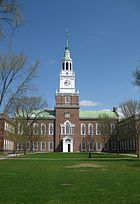
Athletics Ivy League • Football • Lacrosse • Alumni Gymnasium • Hanover Country Club • Leede Arena • Memorial Field • Dartmouth Skiway • Thompson Arena • Scully-Fahey Field • Old division footballCampus Greek system
and societiesHistory People Student life Coordinates: 43°42′30″N 72°17′14″W / 43.708288°N 72.287142°W
Categories:- Dartmouth Medical School
- Schools of medicine in New Hampshire
Wikimedia Foundation. 2010.

